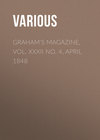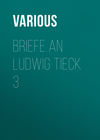Buch lesen: «Graham's Magazine, Vol. XXXII No. 4, April 1848», Seite 7
DECAY AND ROME
Methinks I see, within yon wasted hall,
O'erhung with tapestry of ivy green,
The grim old king Decay, who rules the scene,
Throned on a crumbling column by the wall,
Beneath a ruined arch of ancient fame,
Mocking the desolation round about,
Blotting with his effacing fingers out
The inscription, razing off its hero's name —
And lo! the ancient mistress of the globe,
With claspéd hands, a statue of despair,
Sits abject at his feet, in fetters bound —
A thousand rents in her imperial robe,
Swordless and sceptreless, her golden hair
Dishevelled in the dust, for ages gathering round!
R. H. S.
THE LITTLE CAP-MAKER.
OR LOVE'S MASQUERADE.
BY MRS. CAROLINE H. BUTLER
PART I
Fair Ursula sits alone in an apartment which seems fitted up for the reception of some goddess. She is not weeping, but her dark eyes are humid with tears. An air of melancholy rests on her young face, like a shadow on a rose-leaf, while her little hands are folded despairingly on her lap. The hem of her snowy robe sweeps the rich surface of the carpet, from out which one dainty little foot, in its fairy slipper of black satin, peeps forth, wantonly crushing the beautiful bouquet which has fallen from the hands of the unhappy fair one.
Every thing in this inviting apartment is arranged with the most exquisite taste and elegance. On tables of unique pattern are scattered the most costly gems of art and vertu– choice paintings adorn the walls – flowers, rare and beautiful, lift their heads proudly above the works of art which surround them, and in splendid Chinese cages, birds of gorgeous plumage have learned to caress the rosy lips of their young mistress, or perch triumphantly on her snowy finger. Here are books, too, and music – a harp – a piano – while through a half open door leading from a little recess over which a multaflora is taught to twine its graceful tendrils, a glimpse may be caught of rosy silken hangings shading the couch where the queen of this little realm nightly sinks to her innocent slumbers.
Eighteen summers have scarce kissed the brow of the fair maid, and already the canker worm of sorrow is preying upon her heart-strings. Poor thing, so young and yet so sad! What can have caused this sadness! Perhaps she loves one whose heart throbs not with answering kindness – perhaps loves one faithless to her beauty, or loves where cruel fate has interposed the barrier of a parent's frown!
No – her heart is as free and unfettered as the wind.
Ah! then perhaps her bosom friend, the chosen companion of her girlhood has proved unkind – some delightful project of pleasure perhaps frustrated, or, I dare say she has found herself eclipsed at Madame Raynor's soirée by some more brilliant belle – no, no, none of these surmises are true, plausible as they appear! Then what is it? Perhaps – but you will never guess, and you will laugh incredulously when I tell you that poor, poor dear darling Ursula weeps because – because —
She is an heiress!
That is it – yes, weeps because she is the uncontrolled mistress of one hundred thousand dollars in houses, lands and gold, bright gold!
Poor little dear – looking upon fortune as a serious mis-fortune, and even envying those whose daily toil can alone bring them the necessaries of life; for, have they friends – they are true friends – there is no selfishness in the bond which unites them – while she, unhappy child that she is, owes to her rank and riches her thousand friends and the crowd of satellites worshiping before her! What a foolish notion to enter her little head! True, it is foolish. Lovers, too, in plenty sigh at her feet, and in the soft moonlight the air is tremulous with sighs and music, as from beneath her window steals the soft serenade. But Ursula curls her lip disdainfully, and orders her maid to shut out the sweet sounds. Ever that hateful gold comes between her and her lovers, and then she wishes her lot was humble, that she might be loved for herself alone!
Do you wish a portrait of the unhappy little heiress? Behold her then:
A perfect little sylph, resting on the tiniest of feet, with hands so charming that you would feel an almost irresistible desire to fold them caressingly within your own – the rich complexion of a brunette with the bloom of Hebe on her cheek – her hair like burnished jet – eyes large, lustrous and black – but (alas that there should be a but!) poor Ursula had an unfortunate cast in her left eye – in others words she squinted – yes, absolutely squinted!
Dear, dear what a pity!
Yet stop, don't judge the little heiress too hastily, for after all it was not a bad squint – indeed, if you knew her, you would say it was really a becoming squint, such a roguish, knowing look did it give her! Nevertheless, it was a squint, and poor Ursula, notwithstanding the bewitching form and features her mirror threw back, fancied this a deformity which cast aside all her graces. And here again the gold jaundiced her imagination and whispered, "were it not for me what a horrible squint you would have in the straight forward eyes of the world!
When her parents died Ursula Lovel was but an infant, yet as tender and affectionate as parents had been the good uncle and aunt to whose love and guardianship she was bequeathed. They had no children, and gladly took the little orphan to their bosoms with pity and love – and Ursula required all their watchful care, for she was ever a feeble child, giving no indications of that sprightly beauty and perfect health she now exhibited. Then indeed the squint was truly a deformity, for her thin, sallow countenance only made it far more conspicuous.
People should be more guarded what they say before children. One good old lady by a careless remark instilled into the mind of little Ursula a jealousy and distrust, which, but for the good sense maturer years brought to bear against such early impressions, would have rendered her unhappy for life. Propped up by pillows, she sat at a small table amusing herself by building little card houses, and then seeing them tumble down with all the kings and queens of her little city, when she heard her name mentioned in accents of pity by an old lady who had come to pay her aunt a morning visit.
"She is very plain – is not she? What a great misfortune that her father should have left her so much money! Poor thing, it will only prove a curse to her, for if she lives she will doubtless become the prey of some fortune-hunter."
Now what was meant by "fortune-hunter" – whether some giant or horrid ogress – the little girl could not tell, but that it was some dreadful thing waiting to devour her because she had money, haunted her mind continually. She was a child of fine capacity, and at school generally ranked the highest in her class – how many times her envious mates would say: "Well, well, it is a fine thing to be rich – it is your money, Miss Lovel, makes you so much favored – our teachers are both deaf and blind to your foibles!" What wonder, then, poor Ursula began to distrust herself, and to impugn the kindness of her teachers and friends, who really loved her for her sweet disposition, and were proud of her scholarship.
But don't think that she has been hugging such unhappy thoughts to her bosom ever since, because you have just found her lamenting that she is an heiress!
You shall hear. As childhood passed, health bloomed on her cheek, and shed its invigorating influence over the mind, and it was only when something occurred to arouse the suspicion of early childhood that she indulged in such feelings. She was intelligent and accomplished. Sang like a bird, painted to nature, and danced like a fairy. But there was something more than all this which contributed to her happiness – it was the power of doing good – a power which she possessed, and, through the judgment of her aunt, practiced. This excellent woman had taught her that money was not given her to be all lavished on self – that it was her duty, and ought to be her delight, to loose her purse-strings to the cries of the poor, and to scatter its glittering contents through the homes of the needy. And this did Ursula do – and was rewarded by the blessing of those she had relieved, and the happy consciousness of having mitigated the sorrows of her fellow mortals.
But now this particular evening when you have seen little Ursula drooping under the weight of gold which Fortune it appears has so thanklessly showered upon her, she has met with an adventure which brings before her with all its tenacity the impression so early engendered. And now, as she sits there so sad and sorrowful, she is sighing to be loved for herself alone, and wishes her lot had been humble, that she might trust to professions, and not be forever reminded of that wealth which she fears will always mask the sincerity of those around her.
Silly little girl! She would even exchange all the elegancies and luxuries of life to feed on love and roses!
This unlucky evening she had shone as the most brilliant belle in the crowded assemblage of the fair and fashionable whom Madam Raynor had gathered into her splendid rooms. Tired at length with the gay scene around her, she had strolled off alone into the conservatory, and leaning against a pillar watched from a distance the giddy whirl of the waltz – the waving of feathers, the flashing of jewels, and the flitting of airy forms through those magnificent apartments. A few moments before she left the crowd, she had observed a stranger of very dashing air attentively regarding her, and then joining a friend of hers appeared to request an introduction. But young Allan was just about to join the dance, and ere it was finished Ursula had stolen away.
While engaged as before described, she observed the same gentleman leaning on the arm of Allan strolling toward the conservatory. Concealed by the shadow of a large orange-tree, they passed her unobserved – they then paused in their walk, when Ursula suddenly heard her own name mentioned, and then the following conversation unavoidably fell on her ear:
"Why she squints, Allan!"
"Well, what of that – those that know her best never think of it."
"Pardon me, I consider it a very great defect, and slight as this blemish appears in Miss Lovel, her money could never blind me to the fact if I knew her ever so well."
"I do not mean to imply," answered Allan, "that being an heiress renders the blemish imperceptible – no, it is her truly amiable disposition, her goodness, and engaging manners which makes her so beautiful to her friends."
"O, a pattern woman!" cried the other, "worse yet!"
"What do you mean by a pattern woman?"
"Why, one of those shockingly amiable, running round into dark alleys, charity-dispensing beings – patting white-headed beggar boys, and kissing dirt-begrimed babies – who speak in soft, lisping tones of duty and benevolence – read the Bible to sick paupers, go to sewing meetings and work on flannel – and – "
"There, that will do, Fifield," interrupted Allan, "making some allowance, you have drawn Miss Lovel's character to the life. Shall I introduce you?"
"O certainly, a cool hundred thousand outweighs all my objections against pattern women – I could swallow a sermon every morning with the best grace in the world, and even were she as ugly as Hecate, I could worship at her feet, and wear the yoke for the sake of the golden trappings!"
The young men now passed on, leaving poor Ursula wounded to the quick by the heartless remarks of the fortune-hunter. She did not join the gay assembly again, but requesting a servant to call her carriage, immediately returned home. Now can you wonder at the cloud on her brow?
But see, even while we are looking at her, it is clearing away – like a sunbeam, out peeps a smile from each corner of her rosy mouth, and hark! you may almost hear her merry laugh as clapping her bands she exclaims —
"Yes, yes, I'll do it! What a capital idea – excellent, excellent!" Then rising and bounding lightly to the inner door she threw it wide, saying —
"Here, Hetty, I have something to tell you – come quick."
And at the summons a pretty young girl, seemingly about her own age, made her appearance from the chamber.
"There, Hetty, I am better now," said Ursula, "how silly I am to let the remarks of such a person have power to move me! But I have such a grand project to tell you – come, while you are platting my hair, and, in the words of that same amiable youth, taking off all these trappings, I will let you into my secret."
Hetty took the comb and thridded it through the long tresses of her young lady, which, released from the silver arrow so gracefully looping them on the top of her head, now fell around her nearly to the floor.
"Hetty," exclaimed Ursula, suddenly throwing back her head and looking archly at the girl, "Hetty, do you want to see your mother?"
"O, Miss Ursula," cried Hetty, the tears springing to her eyes, "indeed, indeed I do!"
"Very well, I promise you then that in less than a week you shall be in her arms."
"O, my dear Miss Ursula, do you really mean so?" said Hetty, bending over and kissing the glowing cheek of her mistress.
"Yes, I really mean so – but dear, dear, you have run that hair-pin almost into my brain – never mind – only be quiet now – there, sit down, and I will tell you all about it." There was a roguish expression on Ursula's face as she continued: "Yes, you shall go home, and what's more, Hetty, I am going with you, and mean to live with you all summer, perhaps longer."
"Why, Miss Ursula!"
"Yes I do. And now you must assist me – you must promise me not to reveal to any one, not even to your mother, that I am the rich lady with whom you live. Remember I am a poor girl – poor as yourself – a friend of yours come into the country for – for her health – ha, ha, ha, Hetty, look at me – you must contrive to make me look paler, or shall this be a hectic?"
"But, Miss Ursula – it will never do – you who have always had every thing so beautiful around you – you can never live in our humble way!"
"Try me, try me, Hetty – for I am determined to lest my own individual merits, and see how far they may gain me the love and esteem of others when unsupported by the claims of wealth. Let me see, Hetty, I must have some employment aside from helping you to milk the cows and feed the pigs. Ah, I have it!" she cried, springing up and turning a pirouette – "listen – I will be a milliner! you know, aunt thinks I have a great knack at cap-making – O excellent idea – I will turn milliner for all the farmer's wives and daughters far and near." And catching up her embroidered mouchoir she began folding it into a turban, and then placing it gracefully on her little head, she turned to the laughing girl: "See there now – is not it exquisite – why my caps and turbans will turn the heads of all the swains in the village. You shall have one first, Hetty – you shall set your cap, and heigh-ho for a husband!"
"But your uncle and aunt, Miss Ursula?"
"O, I shall tell them candidly my project. They will laugh at me, I know, and try, perhaps, to dissuade me; but, after all, they will let me do as I please."
Twelve! chimed a beautiful Cupid running off with Time, which, exquisitely wrought in gold and pearl, stood on the dressing-table.
In a few moments Hetty had drawn the rose-colored curtains around the couch of her young mistress, and left her to dreams as rosy.
PART II
And now will you follow me to another scene – an apartment more spacious, and even more elegant, than the one we have just left, save that it savors more of the "sterner sex." For instance, we may see a brace of pistols, superbly mounted, crossed over the mantel-piece – a flute upon the table – a rifle leaning against the wall, and, I declare, fishing-tackle thrown carelessly down, all among those delicate knackeries so beautifully arranged on yonder marble slab – just like the men!
Reclining upon a sofa of crimson satin, wrought with gold thread, wrapped in an elegant dressing-robe, with his feet thrust into embroidered slippers, is a young man of very pleasing exterior, whom we should judge to be about five-and-twenty. The long, slender fingers of one hand are half buried in the rich mass of dark-brown hair which waves over his temples, the other, hanging over the back of the sofa, seems to partake of the disturbance of its master, for it beats and thrums the silken covering most unmercifully. See how he knits his fine brow, and now waves his arm menacingly in the air – what can be the matter!
Ah! you will laugh again when I tell you here is another discontented heir of wealth.
There! now he suddenly starts up as if distracted. "Yelp, yelp!" Ah! poor Fido! although your master seems evidently out of humor, he would not have kicked your beautiful spotted coat had he seen you! There, he caresses you – so fold back your long ears, and wag your tail complacently, while we hear what this impatient youth has to say, as he strides so rapidly hither and thither.
"Well, no doubt wealth is a very fine thing, if the world would let one enjoy it peaceably; but to be thus forever dined, and teaed, and courted, and flattered, and smiled at, and bowed at, and winked at, when, if it were not for my fortune, I very much doubt whether one of these, my exceeding good friends, would give me a dinner to save me from starvation. Why I had rather be the veriest boor that holds a plough, or a cobbler at his last, than to be, as Shakspeare says, "the thing I am." I am heartily sick of it, and could almost turn my back upon the world, and lead a hermit's life. To be always a mark for managing mothers, with great grown-up daughters; aimed at, like a target, by scores of black, grey, and blue eyes; to be forever forced to waltz with this one, and sing with another – and, ere I know it, find myself entrapped into a close tête-à-tête with a third. I wish I was married; then one-half at least of my troubles would be over – for I should shake off this swarm of female fortune-hunters! Married! ah! I wish I was! But where can I find one who will love me for myself alone, and not for the standing my wealth would give her? Married! ah! how delightful to come home and find a dear little wife waiting with open arms to welcome me, and the rosiest and sweetest of lips coaxingly pressed to mine; all my cares forgotten, all my vexations subdued by her soothing caresses and tender words. And then how enchanting as she warbles like a linnet for my ear alone; how enchanting to lean her bewitching little head on my shoulder, and inhale the balmy fragrance of her breath. O! I wish I was married!"
And now, so enraptured does this reasonable youth seem with the picture he has sketched, that not having any thing else, you see, to hug, he throws his arms most lovingly around himself. There, now he frowns again, and – hark what more he has to say.
"In fact, I am not sure I have a real friend in the world, for, gild a fool or a monkey, and mark what a troop of flatterers fawn around and follow admiringly at his heels! And as for choosing a wife, why, were I toothless, one-eyed, or deaf as a post, the magic of gold would transform me into an Adonis!"
Now stopping before a full-length mirror, he appears to console himself for such suppositions, by very complacently regarding his truly elegant figure and classic countenance.
A tap at the door, and an arch face, already shaded by the night-coif, peeps in.
"What, not yet gone to bed, brother – why what are you studying, to be up so late?"
"Studying human nature, Helen – a book with great pretensions to excellence, but – "
"Hush, hush, Frank! not a word more," exclaimed Helen, placing her little hand over his mouth, "not a word more – you read with defective vision! I proclaim the book of human nature to be charming, every page teeming with interest, every line traced by the hand divine, a lesson for a lifetime. Ah! Frank, remove the film of distrust from your eyes, and read this book as it ought to be read, therein you will find truth, goodness, and beauty!"
"Would I could think as you do, Helen. I tell you candidly, I am sick of the world as I find it, and would gladly give all my wealth and expectations to be sure there was one heart that truly loved me – loved me for myself alone."
"A very pretty theory, indeed! Well, you must get married, Frank; I see no other way to cure you – then you will have a dear little book of your own to study – a choice edition of human nature, traced by the feather of Cupid."
"Ah! the very thing I was thinking of; but tell me, Helen, where can I find that same beautiful work?"
"Where you please, brother – there is no danger that you can sue in vain; there is sweet Anna De Kay, roguish little Laura C – , the pensive Sarah – "
"O! don't mention them – pray don't name any more of these city belles!"
"Well, Frank, human nature is most lovely in the simplicity of country life – you must seek some village maid to grace the name of Leland."
"Helen," says Frank, taking her hand, and looking into the large blue eyes sparkling so mirthfully, "Helen, I tell you if I could find an amiable girl, brought up in all the beautiful simplicity of the country, no matter how unskillful in the world's ways – one who, ignorant of my wealth and standing, would unite her fate to mine for better or for worse – then, Helen, I could fall at her feet, and worship her as the star of my life and love."
"Pray, remember, my sentimental brother, ere you squeeze my hand so devoutly, that I am not your artless country maid," exclaimed Helen, laughing; then, after a moment's pause, she cries, gayly, "ah! I have it, Frank; you must masquerade a little, that's all – win your bride under false colors, as a sailor would say."
"Helen, you witch, you darling sister," says Frank, kissing her, "I will do it – yes, to-morrow I will set forth, like Cœlebs, in search of a wife! Now you must help me farther with your lively imagination; you must choose me a profession to masquerade under. I must, of course, for the attainment of my object, sport the character of a poor gentleman, struggling with honest poverty to gain a livelihood. Come, what shall I be – school-master – singing-master – drawing-master – or – "
"O, the last, by all means!" interrupted Helen. "You will have such a fine opportunity of developing the tastes of your fair scholars – ha! ha! ha! Frank, methinks I already see thee helping some blushing milk-maid, with her pail, or, perhaps, leaning against a rail-fence, sketching her, as with bare feet and scanty skirt, she trips through the morning dew to feed her feathery brood."
"Well, you may laugh as much as you please," replies Frank, nothing daunted, "I am firm in my determination."
"And when, most romantic Cœlebs, do you set forth?"
"To-morrow, or next day at furthest. We will talk this over again in the morning, it is too late now – so good night, dear Helen, and pleasant dreams!"
"Good night. Frank!" and gayly kissing her hand, Helen trips out of the room.
Frank Leland laid his head upon his pillow within the walls of a large brick mansion, where the hum of city life penetrated, even through the thick plate-glass and rich window-hangings. But a miracle; no sooner did soft sleep seal his eye-lids, than he found himself in Arcadian scenes – shepherdesses tripped gracefully before him with their flocks; beautiful maidens led him through flowery fields and shady groves; and the little birds up in the trees, and the little romantic fishes down in the brooks, all sang of love and happiness.




















